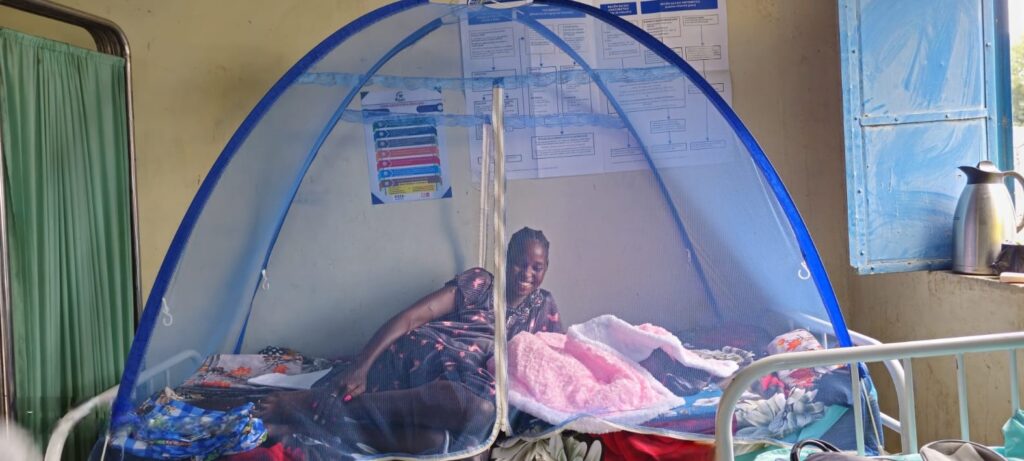In the pitch darkness of a maternity ward in Bentiu, the only light for Nyakal Juai’s delivery came from a small torch held in her midwife’s hand.
The 26-year-old had walked to the newly opened Yoangang health clinic as her contractions began. But when night fell, the unit – supported by the UN population fund (UNFPA) – was plunged into blackness.
“I cannot imagine my baby coming out in the dark, the midwife struggling to hold the torch with one hand and helping me with the other,” Ms Juai told Radio Tamazuj, speaking in a faint voice.
“I was afraid the light would go off. But when I heard my baby cry, I forgot all the bad memories.”
Her relief at the safe birth of her son belies the extreme risks faced by mothers across South Sudan, which has one of the highest maternal mortality rates in the world.
‘Gaps contribute to maternal deaths’
Ms Juai was the first woman to deliver in the new maternity room at the clinic in Bentiu Town, Unity State. Yet the facility lacks the most basic amenities.
“There is no electricity here. No water,” she said. After the birth, neighbours had to help clean up – a rare advantage as her home borders the clinic.
The health workers who delivered her baby face the same conditions daily.
“In the maternity ward, we don’t have lights that will support us at night. We don’t have a water supply. We don’t have a delivery bed,” said Juan Roye, a sexual and reproductive health officer with Health Link South Sudan, the NGO running the clinic.
He told Radio Tamazuj that these critical gaps “directly contribute to maternal deaths in Bentiu.”
A nation in crisis
The challenges in Bentiu are a microcosm of a national emergency. South Sudan records 1,150 maternal deaths per 100,000 live births, a rate among the highest globally.
Only 19% of births are attended by a skilled health worker, and with just 40% of health facilities functioning, nearly 90% of women deliver at home without electricity, water, or medical support.
The situation is exacerbated by widespread flooding, which has isolated entire communities. In the nearby Budaang Primary Health Care Centre (PHCC), which serves a massive population of 37 blocks, the acting officer-in-charge described a system at breaking point.
“Some people walk 8 to 12 hours to reach this facility because others closed due to lack of funding,” said Samuel Gatgei Liir.
He recounted tragic consequences: “During the floods, four newborns died because mothers delivered at home. We also lost a mother to postpartum haemorrhage because she was being carried on a local stretcher and the road was impassable.”
Hope from afar
For some, like 17-year-old Mary (not her real name), reaching a clinic requires a two-day walk. She travelled from her village, Kaljak, to the Nhialdiu PHCU to receive care.
“My home is very far… There is no medicine there,” she said. Married off while still in school, she hopes to return to her education after giving birth, but her future is uncertain.
International support is a lifeline. UNFPA is working to increase skilled birth attendance to 35% by 2030, estimating that improved care could prevent more than 5,500 maternal deaths.
In December 2024, a three-year, $4.5m initiative funded by the Korea International Cooperation Agency (KOICA) was launched to expand maternal health and protection services in crisis-hit regions like Unity State.
“Accessibility to healthcare remains a challenge in most areas of South Sudan,” said Esperance Fundira, UNFPA’s Officer in Charge. “This funding will scale up health and protection services so women and girls can survive and thrive.”
Local officials acknowledge the progress but warn of its fragility.
“Before these health interventions came, women were dying because they simply could not reach a health facility,” said Michael Nyuon Gat, Acting Director for Reproductive Health in Unity State.
He noted that some areas are still only accessible by boat or canoe. “If a mother goes into labour there with complications, the delay alone can put her life at risk.”
As another day ends at the Yoangang clinic, midwives prepare for more deliveries in the dark. For the women of Unity State, the hope remains that stable electricity, clean water, and passable roads will one day be a reality, making childbirth a time of celebration, not mortal danger.




